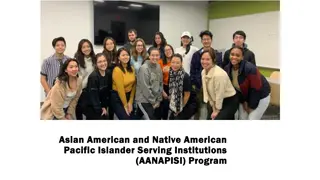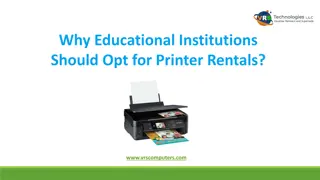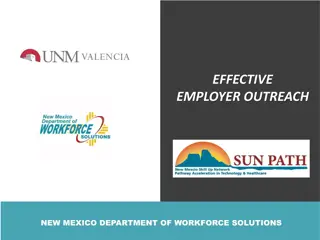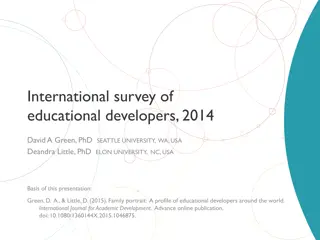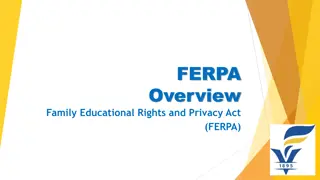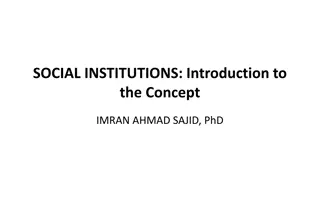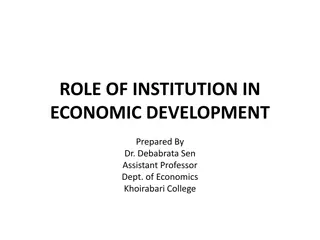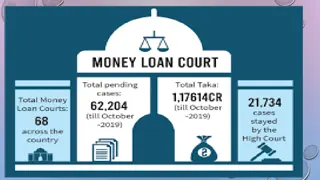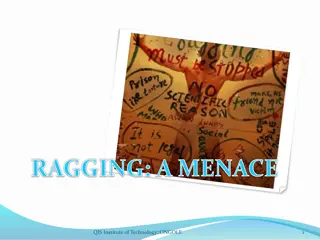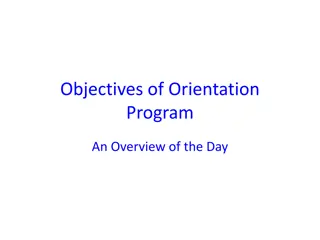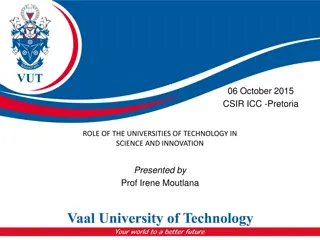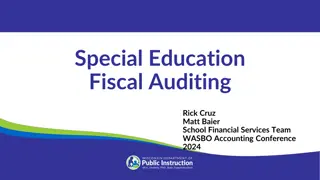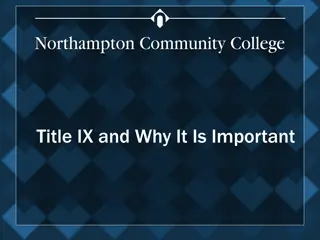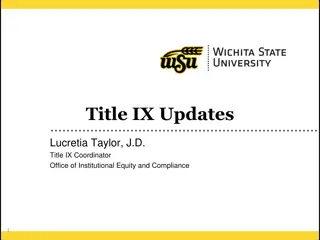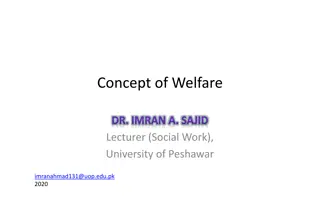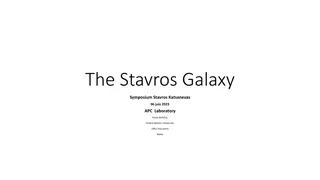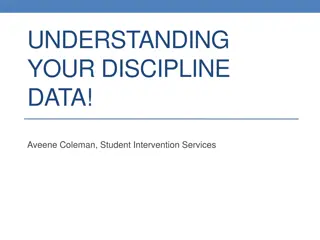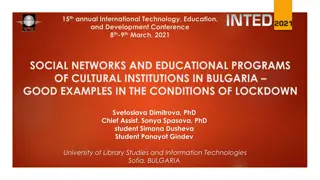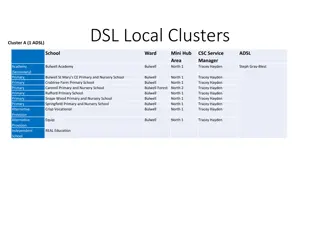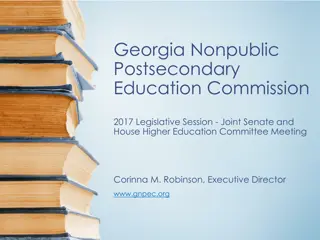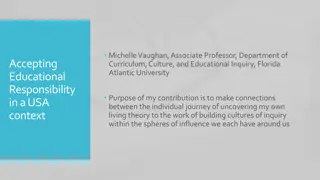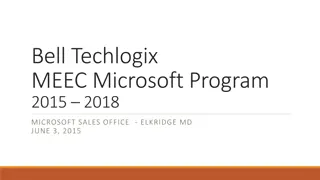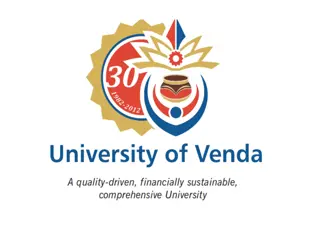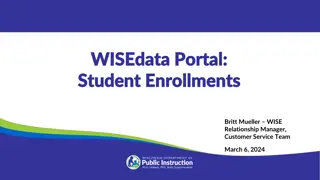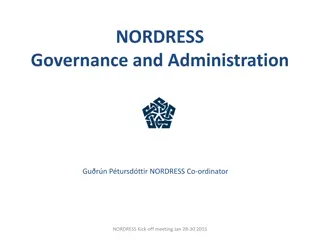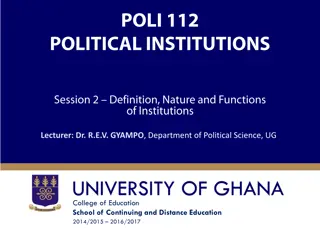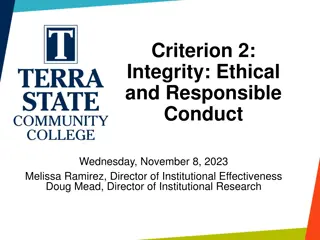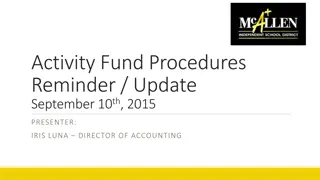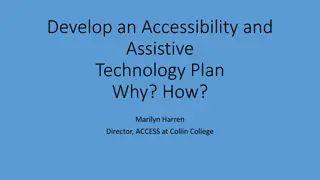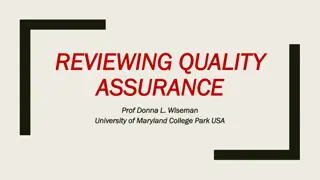Enhancing Educational Resilience with RESTA Model
RESTA is an evidence-based intervention model designed to boost Educational Resilience in young individuals by involving educational staff. It differs from other support models by incorporating insights from educational resilience and trauma-responsive practices. Two underpinning models and RESTA pr
0 views • 12 slides
Why must students opt for universities in the U.K. instead of other countries
he United Kingdom is home to some of the world\u2019s most prestigious educational institutions. Oxford, Cambridge, and University College London are exceptional educational institutions. The Q.S. World University Rankings include 76 UK-based institutions.
0 views • 3 slides
Negotiating Working Time Agreements in Educational Institutions
Explore the process of negotiating working time agreements at educational institutions, including the general principles, contractual details, core activities, and time allocation concepts. Discover how teachers and management balance priorities in the context of changing educational initiatives.
4 views • 36 slides
Overview of AANAPISI Program in the United States
The Asian American and Native American Pacific Islander Serving Institutions (AANAPISI) Program aims to support institutions with a minimum of 10% Asian American and Native American Pacific Islander undergraduate enrollment. Currently, there are 54 funded AANAPISI institutions across 16 states and t
0 views • 13 slides
Why Educational Institutions Should Opt for Printer Rentals?
VRS Technologies LLC provides Printer Rental Dubai services that help schools save money and avoid the hassle of maintenance. Renting allows educational institutions to access the latest printer models only when needed. Reach us at 0555182748 for more information on our rental plans.
1 views • 8 slides
Innovative Strategies in Employer Outreach for Educational Institutions
Explore effective employer outreach approaches and outcomes for educational institutions in New Mexico, focusing on employer relations, skills match gap closure, advisory councils, program development examples, and successful student placements in relevant roles. Discover how connecting employers to
0 views • 47 slides
International Survey of Educational Developers: Insights and Trends
Explore findings from the 2014 international survey of educational developers, revealing key demographics, institutions, roles, and disciplinary data. Discover insights on gender, age, continental location, and the most valued criteria at educational institutions. The survey offers a comprehensive s
0 views • 19 slides
Understanding FERPA: Family Educational Rights and Privacy Act
FERPA, the Family Educational Rights and Privacy Act, is a federal law that safeguards the confidentiality of student educational records and privacy rights. It grants parents rights until the student turns 18 or enters a postsecondary institution. Students can inspect records, seek amendments, cons
0 views • 19 slides
Sir Syed Ahmad Khan: The Pioneer of Educational Reform in India
Sir Syed Ahmad Khan, a prominent Muslim scholar and reformer, played a crucial role in awakening the Muslim community to strive for educational upliftment and societal progress. Despite facing financial challenges, he excelled in various fields of study and contributed significantly to improving edu
0 views • 44 slides
Understanding Social Institutions: An Introduction by Imran Ahmad Sajid, PhD
Discover the concept of social institutions through Dr. Imran Ahmad Sajid's explanation. Explore how institutions are established practices that shape complex social forms, distinguishing between institutions and conventions, and their relation to society and culture. Delve into the role of institut
0 views • 14 slides
Role of Institutions in Economic Development: A Comprehensive Analysis
Understanding the significance of institutions in economic development is crucial, as they play a pivotal role in shaping societal, political, and economic relations. Institutions, defined as established customs or practices, act as the rules of the game that structure human interactions. Their qual
0 views • 13 slides
Artha Rin Ain 2003: Special Legislation for Financial Institutions' Debt Recovery
Artha Rin Ain 2003 is a special legislation aimed at enhancing the recovery process of outstanding debts of financial institutions in Bangladesh. The law addresses the shortcomings of previous acts and establishes dedicated courts for the swift resolution of cases involving unpaid claims. It encompa
0 views • 15 slides
Understanding the Menace of Ragging in Educational Institutions
Ragging, defined as any disorderly conduct causing annoyance, hardship, or psychological harm to junior students, is a serious issue prevalent in educational institutions. Originating from British colonial practices, ragging can lead to physical and psychological trauma, human rights abuses, and eve
0 views • 12 slides
Understanding Outcome-Based Accreditation for Educational Institutions
Gain insights into the importance of accreditation for educational institutions and the continuous improvement process it entails. Today's program focuses on Outcome-Based Accreditation, providing essential knowledge and tools for faculty and institution heads. Speakers include experts from the Nati
0 views • 30 slides
Role of Universities of Technology in Science and Innovation
Introduction to the role of universities of technology in advancing science and innovation, highlighting the mandate of higher education institutions to create a conducive educational environment. The narrative explores the challenges and opportunities facing educational institutions, emphasizing th
0 views • 20 slides
Audit Requirements and Compliance Guidelines for Wisconsin Educational Institutions
Explore the audit requirements and compliance guidelines applicable to educational institutions in Wisconsin, including special education fiscal auditing, Uniform Administrative Requirements, and risk-based program identification. Learn about the State Single Audit Guidelines, Wisconsin School Distr
1 views • 26 slides
Understanding the Impact of Title IX Legislation on Educational Institutions
Title IX is a pivotal federal law that prohibits sex-based discrimination in educational programs receiving federal financial aid. It applies to all public and private educational institutions that receive federal funds. This legislation has had a profound impact by ensuring gender equality in educa
0 views • 24 slides
Understanding Regulations on Course Repetition in Educational Institutions
Exploring the regulations governing credit course repetition in educational institutions, with insights on past rules, current changes, and guidelines to address repetition issues effectively. Topics covered include enrollment limits, apportionment rules, and the importance of adhering to regulation
0 views • 64 slides
Comprehensive Fixed Assets Management Guidelines for Educational Institutions
Explore a detailed guide on tracking and recording fixed assets in educational institutions, covering key aspects such as capital assets accounting procedures, general ledger accounts, and the definition of capital assets. Learn the minimum standards for valuing assets, recording guidelines, and the
0 views • 25 slides
Understanding Title IX in Educational Institutions
Title IX of the Higher Education Act of 1972 prohibits sex discrimination in educational institutions receiving federal funding. It ensures equal access and opportunities for all, covering areas from admissions to athletics and addressing issues like sexual violence and harassment. Compliance with T
0 views • 30 slides
Understanding Social Institutions and Welfare in Human Society
Social institutions play a crucial role in addressing social problems and meeting the basic needs of human societies. Concepts of welfare and institutions like family, education, economy, and politics are explored. Welfare is described as traveling smoothly on the road of life, derived from the root
0 views • 21 slides
Financial Reporting Best Practices for Educational Institutions
Educational institutions like WWCC should develop comprehensive financial reports to provide valuable information to their boards and management. Reports should cover operating expenses, grants and contracts, capital budgets, and adjunct faculty funding. Using standardized reports helps ensure accur
0 views • 11 slides
Innovative Educational Actions and Impact at Stavros Galaxy Symposium
Explore the poetic inspiration of Stavros in Sifnos, his regeneration place, and delve into the impactful educational activities initiated since 2017 in collaboration with APC Lab, CNRS, GENERA team, and EGO colleagues. From biodiversity forums to gender equality initiatives to educational forums at
0 views • 5 slides
Understanding Banking Institutions and Their Types
Banking institutions play a vital role in the financial sector by mobilizing public savings and providing funds to meet various financial needs. Commercial banks, investment banks, co-operative banks, and central banks are some examples of banking institutions. Scheduled banks enjoy certain benefits
0 views • 17 slides
Understanding Discipline Data Collection in Educational Institutions
The data illustrate the importance of accurately reporting discipline and truancy data using Incident Management Systems in educational institutions for the 2019-20 school year. The process involves coding data in Incident Management, avoiding additional codes, and adhering to federal reporting requ
0 views • 60 slides
Social Networks and Educational Programs of Cultural Institutions in Bulgaria: Examples During Lockdown
This paper explores the impact of the COVID-19 lockdown on educational initiatives in cultural institutions in Bulgaria, highlighting the use of social networks and virtual platforms for engaging audiences. Researchers from the University of Library Studies and Information Technologies in Sofia disc
0 views • 16 slides
Cluster Network Overview of Schools in North Nottingham
This cluster network overview showcases the educational institutions in North Nottingham, including primary schools, secondary academies, alternative provisions, and independent schools. The clusters, managed by Tracey Hayden, cover a wide range of educational services, from vocational programs to s
0 views • 5 slides
Explore the Diverse Educational Offerings at Mkhitar Sebastatsi Educational Complex
Discover a dynamic educational complex, Mkhitar Sebastatsi Educomplex, offering a multilingual website, e-magazines, online TV and radio, eight distinct schools, educational projects, and various educational clubs for high schools. The institution fosters creativity and excellence through a range of
0 views • 18 slides
Georgia Nonpublic Postsecondary Education Commission Overview
Georgia Nonpublic Postsecondary Education Commission (NPEC) is the state agency in charge of regulating private postsecondary institutions in Georgia and out-of-state institutions operating within Georgia. Established in 1990, NPEC ensures educational and financial stability, maintains standards, an
0 views • 10 slides
Cultivating Cultures of Inquiry in Education
Associate Professor Michelle Vaughan from Florida Atlantic University discusses the importance of accepting educational responsibility and building cultures of inquiry within educational institutions. She emphasizes values like vulnerability, authentic connection, mindful questioning, and loving edu
0 views • 4 slides
Microsoft Licensing Overview for Education Institutions
Explore the diverse licensing options available for educational institutions through the Microsoft Enterprise Agreement Program. Learn about the benefits of different licensing tiers, applications included, upgrade rights, and VDI environment solutions. Discover the Core and Enterprise CAL Suite Por
0 views • 20 slides
Managing Enrollment Counts for Educational Institutions
Enrollment counts are crucial snapshots of student enrollment and demographic data collected at the beginning of the school year. This data is vital for program validation, allocations, and growth assessment by educational departments. Proper coordination and adherence to guidelines ensure accurate
0 views • 15 slides
Understanding Cohort Analysis in Educational Research
Cohort analysis in educational research involves studying a group of students meeting specific criteria to analyze trends over time. Baseline data is crucial for comparison, and it helps institutions track student persistence, retention, and attrition rates. By establishing baselines, institutions c
0 views • 12 slides
Importance of Enrollment Records in Educational Institutions
Enrollment records play a crucial role in determining services provided to students, ensuring accountability, and tracking full academic year attendance. Timely management of enrollment dates is essential for student success and proper data flow. Explore the significance of accurate enrollment recor
0 views • 23 slides
NORDRESS Project Governance and Administration Overview
The NORDRESS project involves various entities like the Executive Board, Council, Partner Institutions, and Supporting Institutions for day-to-day management, decision-making, and overall support. The Project Manager from the University of Iceland plays a central role, coordinating activities and li
0 views • 13 slides
Understanding Political Institutions and Their Significance in Governance
Dr. R.E.V. Gyampo, a lecturer in the Department of Political Science at UG College of Education, explains the concept of institutions, distinguishing between formal and informal ones. He emphasizes the importance of rules within institutions for predictability and behavior governance. The discussion
0 views • 14 slides
Integrity in Educational Institutions: A Deep Dive into Criterion 2
Explore the significance of Criterion 2 - Integrity: Ethical and Responsible Conduct in educational accreditation. Delve into core components like ethical behavior, transparency, governance autonomy, academic freedom, and responsible knowledge acquisition. Understand the essential role of integrity
0 views • 26 slides
Guidelines for Managing Activity Funds in Educational Institutions
Managing activity funds in educational institutions involves clear responsibilities for various personnel including the campus principal, bookkeeper, and club sponsor. It outlines proper procedures for collecting, disbursing, and accounting for funds, emphasizing safekeeping and adherence to policie
0 views • 18 slides
Developing an Accessibility and Assistive Technology Plan for Educational Institutions
Developing an Accessibility and Assistive Technology Plan is essential for educational institutions to comply with regulations such as ADAAA, Title II, Section 504, and Section 508. This plan aids in providing equal access to students with disabilities, ensuring compliance with federal standards and
0 views • 31 slides
Understanding Quality Assurance in Educational Institutions
Quality assurance in higher education institutions involves monitoring, evaluating, and improving all aspects of operations and programs to ensure academic excellence. It encompasses processes like benchmarking, stakeholder engagement, and continuous improvement through evidence-based planning. Key
0 views • 13 slides



